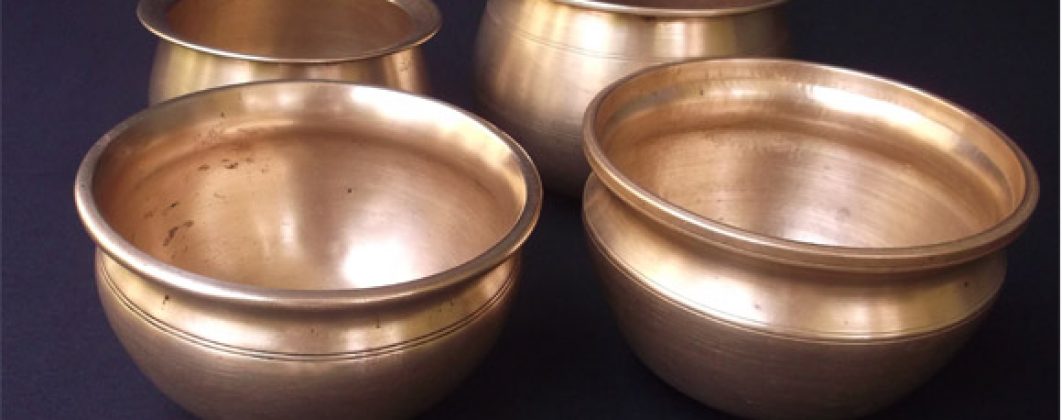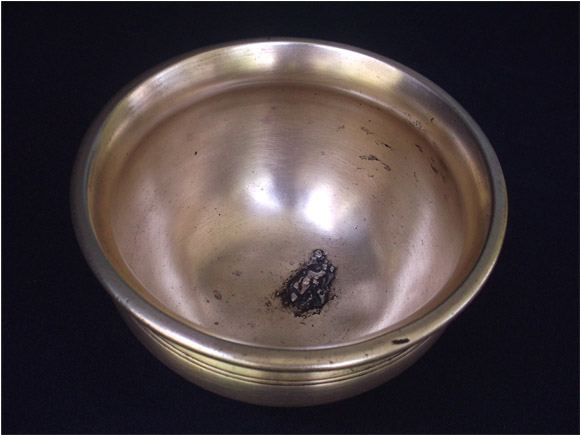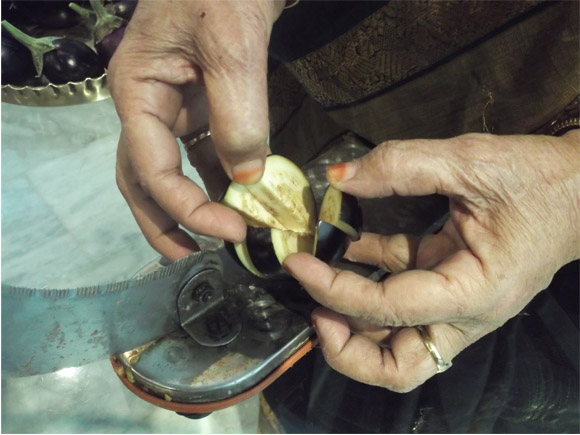

The antique brass and bronze pots shown here are exclusively used for cooking Andhra Curries. In traditional Andhra meal there will be five items invariably – Muddapappu, curry, chutney, pulusu, rasam and curds or butter milk with lots of accompaniments like pickles, powders, appadam, vadiyalu, ooramirapakayalu etc. Out of all Andhra meal items curry, known as koora takes an important position. It is the main dish. So the success of the meal depends on the success of the curry. Hence dedicated vessels are used to prepare this important dish. I have collected four curry pots and out of them two are from Andhra and two are from Tamil Nadu.The curry pots from Andhra are made with brass metal and called kooraginny and the ones from Tamil Nadu are made with bronze metal and called vengalapannai. Both the varieties have different shape though the utility and the functionality are same. In Hindi language curry pot is called handi.



The Andhra Brass curry pots have beautiful shape that serve both for functional purpose and aesthetic value.The” U” shaped coking vessel has a thick body so that the heat is distributed uniformly and the curry is cooked evenly.The brass pot has wide open mouth to facilitate easy movement of the ladle that is used for stirring the contents for uniform cooking.There is a wide rim at the mouth of the vessel so that the vessel is not slipped at the time of handling and to have a firm grip.The wide mouth with the rim also helps in sealing the mouth with a metal plate to prevent the spicy vapors going out of the pot and preserve the moisture.




The Tamil Nadu counterparts have a lovely bowl like shape with narrow base and wide mouth.There is a grove between the main body of the cooking pot and the opening.This groove is designed for the hand grip and gives excellent aesthetic sense.The narrow base allows the flames of the fire stretch up to the full length of the pot giving the pot uniform heat for excellent cooking results.I have acquired these enchanting pieces from an antique dealer in Madras, now called as Chennai, the capital city of Tamil Nadu state.




The Andhra pots are the family inheritance. These pots were used by my mother and she used to turn out very delicious curries from these beauties. I also understand that my grandfather’s mother-in-law, KavammaGaru (garu is a respectable way of addressing elders), alsoused these wonderful pots for cooking mouth-watering curries. Her special dish was Vankaya karampettina koora. I understand that in our village Someswaram, the neighbours of our house used to plead with KavammaGaru to prepare this special dish and she used to prepare and distribute to them and enjoy such service as a gesture of good will. Even after her death, whenever they think of Kavammagaru, they used to praise her Vankaya karampettina koora. I am presenting the recipe of this wonderful dish passed on from Kavammagaru to my mother and there upon from my mother to my sisters and later to my wife. This antique brass curry pot and the recipe of Vankaya karampettina koora are more than 100 years old .The recipe is preserved and practiced by my wife so that we do not lose touch of this rare delicious dish.
How to cook Vankaya Kharampettina koora in Antique brass curry pot
The recipe for Vankaya Kharampettina koora
The speciality of the vankaya karampettina koora is that it is stuffed with a spicy powder of lentils, fenugreek seeds and redchillies. The fine taste of Indian lentils combined with the flavour of fenugreek seeds and the hot taste of red roasted chillies gives this dish a rare combination of taste that is to be experienced. The name Vankaya karampettina koora means the brinjal stuffed with hot spices. The brinjal is also called as aubergine or eggplant.
Ingredients required
12 fresh tender purple brinjals of round shape.
2 table spoons of Sanagapappu (Bengal gram)
2 table spoons of Minapapappu (Black gram)
Menthulu: 1/2 table spoon of Menthulu (fenugreek seeds)
10to12 Medium sized red dry chillies.
Preparation
Wash thoroughly the brinjals with the stalks. Trim the stalk ends.
To prepare the stuffing powder:
Take the antique brass curry cooking pot and heat it moderately on fire.Add ½ a table spoon of oil. When the oil is on medium heat add fenugreek seeds first followed by Bengal gram, black gram and red chillies cut into pieces.Fry till the grams take a golden brown colour and the red chillies take a darker shade of colour.Remove from the heat and cool the mixture in a plate.Put the mixture in a grinder and grind to a granular powder.Powder should not be too fine.It should be granular.
Prepare the brinjal for stuffing:
Take each brinjal and slit the bottom end upwards towards the stem till you reach the ¾ length of the brinjal .Make another similar slit from the bottom of the brinjal this time at right angles to the previous slit thus slitting the brinjalinto 4 sections. Now the brinjal is ready for stuffing. Now stuff the powder into the slit sections of each brinjal till it holds. Stuff all brinjals.
Cooking the stuffed brinjal:
Heat 2 table spoons full of oil in the antique brass cooking pot .Add the stuffed brinjals one by one. Stir the brinjals in the vessel so that the oil is smeared to each brinjal. Scatter the remaining powder over the brinjals. Sprinkle ¼ cup of water on the brinjals in the curry pot and cover with a thick plate as a lid on the pot, pour ¼ a cup of water in the plate, keep the fire in low and let the contents simmer on a low fire for 20 minutes.The water in the cover plate gets heated and there is heat surrounding the entire curry pot. This gives uniform heat to the brinjals for excellent cooking and seals the juices and flavors inside the pot. Keep tossing the brinjals occasionally by tilting the curry pot with jerks by holding the rim of the pot with a dry cloth. Stirring by ladle may damage the shape of the brinjal. Cook for another 20 minutes or till the brinjals are well cooked to a tender soft condition. When you take them into serving dish hold each brinjal by stem or use a flat spoon like atlakada or dosa ladle.
Taste superb with hot rice and ghee or roti.












Copyright © 2021 YK Antiques Home Museum
13 Responses
అన్నయ్య,
సూరక్క చేతి వంట, అదీ గుత్తి వంకాయ కూర; మళ్ళీ, ఇత్తడి గిన్నెలో వంట!!
ఆహా!
“వంకాయవంటి కూర, పంకజ ముఖి సీత వంటి భార్య, శంకరుని వంటి దైవము, లంకాపతి వైరి వంటి రాజు లేరు కదా మహిలో సుమతీ!”
ధనోస్మి! – మధు పాలెపు
thank you for sharing.
తమ్ముడు ,నీ వర్ణన అద్భుతం ! ఏమి కవిత్వం !! నేను వంకాయ అభిమానిని ఉందుకే మనసారా రాసేను. అక్క వచ్చిన సందర్భం బాగా కలసివచ్చింది . నీకు నచ్చినందుకు చాలా ఆనందంగా ఉంది . నీకు తెలుగు లిపి లోనే రాయాలని తెలుగు లిపి నేర్తుకొని ఇప్పుడు రాస్తున్నాను . అందుకే ఆలస్యం !
భళిరా ! తమ్ముడూ !!
meeru chupinchina kanchu koora vonde patralu madras lo vethikaanu.. chinnavi ekkada levu..
Simply lovely!
all this for sell
How can I buy these bronze pots for cooking. Please let me know if any sellers for this.
How can I buy these bronze pots for cooking. Pls let me know if any sellers
Hello. Thank you for writing to us. Here are some leads that might help:
1. Brass and Bronze Cookware – Zishta (click to open)
2. Bronze Cook Pot – Essential Traditions (click to open)
Note – We do not endorse or have any tie-up with the brands listed above.
How can I buy these bronze pots for cooking.
Hi sir..Can we prepare spicy and tangy food in brass or bronze vessels?? I was instructed to use it for only bland food preperation.. like rice or muddhe.. pls help me with this confusion sir..
Hello. Thank you for writing to us. You can prepare spicy food in brass vessels but not tangy food. Items like tamarind, lime, raw mango, vinegar etc. which are tangy in taste will react with the metal and alter the composition of the food and this may not agree with the human body system.
Tin coating (kalai) for brass cooking vessels – If you provide tin coating inside the brass vessel, you can cook all types of food.
Bronze cooking vessels – In the case of bronze vessels, you can cook spicy food and store in it also. You can also cook tangy food but you cannot store it for a short period of time but not for a long time since it may react with the metal and spoil the composition of the food.
Please note, you can not do tin coating for bronze vessels. Bronze will not accept any coating on its surface.
Hope this information helps.
Sir I’m from Chennai and my grandmother had curry pots just like the ones u have shown. Unfortunately they were lost many years ago while shifting houses. I miss her food made in those vengala panai. Is there any address or shop name in chennai from where u were able to buy them.